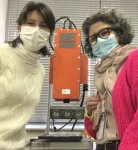(Press-News.org) Highlights
Excessive alcohol consumption causes short-term and long-term health problems
An enzyme called ADH1B accelerates the breakdown of alcohol in the body
Researchers genetically engineered a probiotic to express ADH1B in mice
Mice treated with the probiotic recovered from alcohol exposure faster than untreated mice, and had fewer resulting health problems
Washington, DC – Excessive alcohol consumption leads to painful hangovers and accompanying headaches, fatigue, and nausea. Drinking alcohol has also been linked to a raft of health problems in the human body, including heart disease, cirrhosis, and immune deficiency. One way to avoid those consequences would be to drink less, but researchers in China have introduced another way to mitigate hangovers and other adverse outcomes — a genetically-engineered probiotic.
In a paper published this week in Microbiology Spectrum, the researchers described their approach and reported that in experiments on mice, the treatment reduced alcohol absorption, prolonged alcohol tolerance, and shortened the animals’ recovery time after exposure to alcohol. The probiotic hasn’t yet been tested on humans, but the authors predicted that if it confers the same benefits, it could present a new way to reduce alcohol-induced health problems, and liver problems in general.
Meng Dong, Ph.D, at the Chinese Academy of Science’s Institute of Zoology, who worked on the study, noted that clinical applications may extend beyond alcohol-related conditions. “We believe that genetically engineered probiotics will provide new ideas for the treatment of liver diseases,” she said.
The human body primarily uses forms of an enzyme called alcohol dehydrogenase, or ADH, to metabolize alcohol. But some variants are more effective than others: Some studies have found that a form called ADH1B, found primarily in East Asian and Polynesian populations, is 100 times more active than other variants. Previous studies on mice have shown that viral vectors genetically engineered to express ADH1B can accelerate the breakdown of alcohol, but that approach hasn’t been shown to be safe in humans.
Motivated by those findings, Dong and her colleagues looked for a safer delivery method, focusing on the probiotic Lactococcus lactis, a bacterium often used in fermentation. They used molecular cloning to introduce the gene for human ADH1B into a bacterial plasmid, which was then introduced into a strain of L. lactis. Lab tests confirmed that the probiotic secreted the enzyme. The researchers encapsulated the probiotic to ensure it would survive against stomach acid, then tested it on 3 groups of 5 mice, each exposed to different levels of alcohol.
Untreated mice showed signs of drunkenness 20 minutes after exposure to alcohol. When the mice were placed on their backs, for example, they were unable to get back on their feet. But in the group that received a probiotic that expressed human ADH1B, half the mice were still able to turn themselves over an hour after alcohol exposure. A quarter never lost their ability to turn themselves over.
Further tests showed that 2 hours after exposure, blood alcohol levels in the control group continued to rise, while those in the probiotic-treated mice had begun to fall. In addition, the researchers found that treated mice showed lower levels of lipids and triglycerides in their livers, suggesting that the probiotic could alleviate alcohol-related damage to that organ.
The next step, Dong said, is to investigate whether the potential therapeutic effect of the modified probiotic extends to humans. “We are excited about the improvement of recombinant probiotics in acute alcohol-induced liver and intestinal damage,” Dong said.
###
The American Society for Microbiology is one of the largest professional societies dedicated to the life sciences and is composed of 30,000 scientists and health practitioners. ASM's mission is to promote and advance the microbial sciences.
ASM advances the microbial sciences through conferences, publications, certifications, educational opportunities and advocacy efforts. It enhances laboratory capacity around the globe through training and resources. It provides a network for scientists in academia, industry and clinical settings. Additionally, ASM promotes a deeper understanding of the microbial sciences to diverse audiences.
END
In the United States, federal laws were created to effectively decriminalize prostitution in minors under the age of 18. However, state and local justice systems continue to arrest and incarcerate minors for prostitution, despite widespread agreement that youth involved in commercial sexual exploitation are victims, not offenders.
Most youth tend to fall victim to child prostitution and sex trafficking between the ages of 12 and 14. Victims of child prostitution have especially high rates of prior physical, sexual and emotional abuse as well as neglect.
Calli M. Cain, Ph.D., an assistant professor at Florida Atlantic University’s College of Social Work and Criminal ...
Complimentary press passes are now available for NUTRITON 2023, the annual flagship meeting of the American Society for Nutrition. Join us July 22-25 in Boston to hear about the latest developments in nutrition research, practice, and policy.
After three years of virtual meetings, NUTRITION 2023 will bring the nutrition community back together to share cutting-edge research on nutrition and food science, diet and disease, clinical applications, global health, and more. As one of the world’s largest nutrition ...
Scientists at The Hospital for Sick Children (SickKids) and the University of Toronto (U of T) have combined forces to develop a new approach to potentially treat tumour cells, called mechanical nanosurgery, even for aggressive, chemoresistant cancers.
Glioblastoma (GBM) is the most common and aggressive primary brain cancer. Despite various treatment options that exist, including surgery, radiotherapy, and chemotherapy, the median survival time for patients is only around 15 months.
The current global standard-of-care treatment for GBM patients includes chemotherapy using a drug called temozolomide (TMZ), which extends a person’s life expectancy by approximately two months compared ...
Ithaca, NY—Deteriorating habitat conditions caused by climate change are wreaking havoc with the timing of bird migration. A new study demonstrates that birds can partially compensate for these changes by delaying the start of spring migration and completing the journey faster. But the strategy comes with a cost—a decline in overall survival. The findings by researchers from Cornell University, the University of Maryland, and Georgetown University are published in the journal Ecology.
"We found that our study species, the American Redstart, can migrate up to 43% faster to reach its ...
The Korea Institute of Civil Engineering and Building Technology (KICT, President Kim, Byung-suk) has been participating as Korea’s representative organization in the Energy in Buildings and Communities (EBC) programme, an Technical Cooperation Programme under the International Energy Agency (IEA), since 2005.
The International Energy Agency Energy in Buildings and Communities Programme (IEA EBC) is an international research organization with 25 member countries including the United States, Japan, Germany, France, and, more recently, Brazil and Turkey. Established in 1977 in response to the global energy crisis, EBC aims to conduct research on conserving energy and ...
Viruses are usually associated with illness. But our bodies are full of both bacteria and viruses that constantly proliferate and interact with each other in our gastrointestinal tract. While we have known for decades that gut bacteria in young children are vital to protect them from chronic diseases later on in life, our knowledge about the many viruses found there is minimal.
A few years back, this gave University of Copenhagen professor Dennis Sandris Nielsen the idea to delve more deeply into this ...
VANCOUVER, Wash. – Gossip influences if people receive advantages whether they work in an office in the U.S. or in India—or even in a remote village in Africa, a Washington State University study found.
In a set of experiments, WSU anthropologists found that positive and negative gossip influenced whether participants were willing to give a person a resource, such as a raise or a family heirloom, especially when the gossip was specific to the circumstance. For instance, positive gossip concerning ...
Research Highlights:
A wireless or leadless (without wires) pacemaker was implanted in a select group of children with irregular heart rhythms during a 5-year period (2016-2021).
Smaller catheters that allow easier placement of the leadless pacemaker in children’s smaller bodies may expand wireless pacemakers as an option to consider for more children with irregular heart rhythms.
DALLAS, April 11, 2023 — Wireless or leadless pacemakers, commonly implanted in adults, may be a safe and effective short-term ...
An innovative method developed by an Italian team is emerging that will revolutionize the field of archaeology and radiocarbon dating and protect our cultural heritage. The researchers have used it with surprising results on archaeological bones, making the ‘invisible’ visible.
This important achievement-published in the journal Communications Chemistry of the Nature group-is the result of extensive research work coordinated by Professor Sahra Talamo, in which experts in the field of analytical chemistry from the University of Bologna and the University of Genoa collaborated.
The group has developed a new technique for analyzing archaeological ...
Given the battles over COVID-19 rules and recommendations in the United States over the past three years, the findings of a new UCLA-led study may come as a bit of a shock: Globally, those who professed to hold traditional values tended to adhere more closely to coronavirus-prevention measures than those who considered themselves more liberal.
“Across a wide range of countries, people who endorsed traditional cultural values — a position that often underlies socially conservative political philosophies — ...





